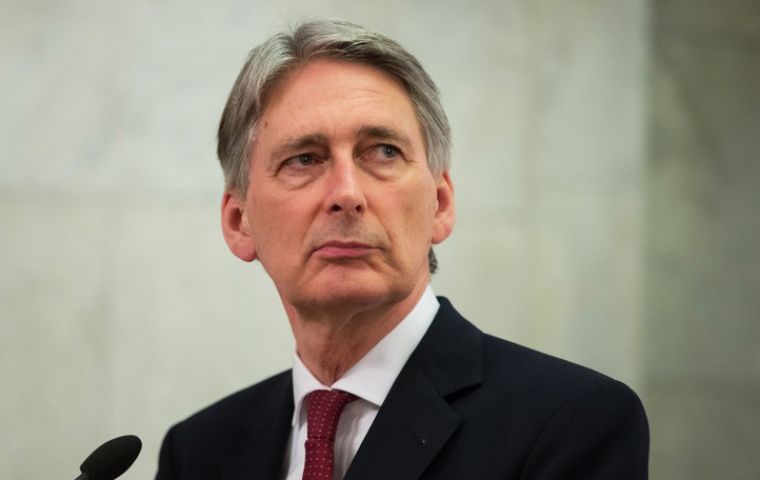MercoPress. South Atlantic News Agency
Hammond tells business leaders that jobs and prosperity are first priorities of Brexit negotiations
 Hammond said the UK government had to “focus relentlessly” on the key components of a free trade deal and customs agreement that “minimizes friction”
Hammond said the UK government had to “focus relentlessly” on the key components of a free trade deal and customs agreement that “minimizes friction” Brexit is not a dominant issue for European Union countries, Chancellor of the Exchequer Philip Hammond acknowledged as he called for jobs and prosperity to be the first priority in the negotiations. The Chancellor told business leaders that the UK had to remember that Brexit was “just one among many challenges” facing the other EU members.
Hammond said the UK government had to “focus relentlessly” on the key components of a free trade deal and customs agreement that “minimizes friction”, with transitional arrangements to avoid a cliff-edge change on the day the UK breaks away from Brussels.
Curbing migration has been a key demand for many Brexit supporters, but Mr Hammond said that while managing the system was important, businesses and public services must be able to recruit from overseas.
In a speech at a Confederation of British Industry dinner, Mr. Hammond said the right Brexit outcome would mean: “A comprehensive free trade deal in goods and services that allows the complex value chains that crisscross our continent to continue to operate smoothly.”
“A customs arrangement that minimizes friction at the border with a transition that prioritizes protection of the free flow of trade across our borders until the agreed long-term arrangements can be put fully in place.”
“A future relationship that acknowledges our need to manage migration but allows British businesses and public services to continue to recruit the labor they need to deliver both economic growth and our social objectives.”
The deal would acknowledge the “legitimate concerns” of the EU around regulation of financial markets and set up a “co-operative supervisory structure”.
“We seek a shared understanding on what the future relationship looks like as early as possible and an agreement with our EU partners that it will be in our mutual interest that there will be a smooth and orderly path to the new arrangements, rather than a disruptive and dangerous cliff-edge.”
“Because what businesses and citizens crave more than anything is clarity about the future.”
Mr Hammond acknowledged that Brexit was not the main issue on the agenda for many EU countries. After speaking at a German business conference, he said he was “struck once again during that visit by the ‘asymmetry of attention’ to this issue. For us, Brexit is the dominant focus; for many of our continental partners, it is just one among many challenges vying for attention.”
“We need to remember that fact as we seek their attention to make these arguments,” he said. “And it is incumbent on all of us, in business and in government alike, to go on making the case for a Brexit outcome that protects jobs and prosperity and a transition that takes us to it smoothly.”
Mr Hammond urged business leaders to have their say, including by contributing to a new advisory group being set up with Brexit Secretary David Davis and Business Secretary Greg Clark.




Top Comments
Disclaimer & comment rules-

Read all commentsThe question is why is this piece appearing in Mercopenguin, a propaganda organ supposedly devoted to America, South America and the “South Atlantic”?
Jul 08th, 2017 - 12:26 am 0Commenting for this story is now closed.
If you have a Facebook account, become a fan and comment on our Facebook Page!